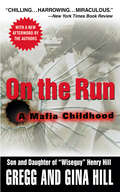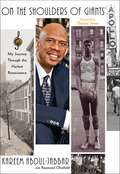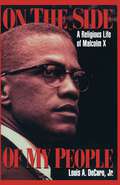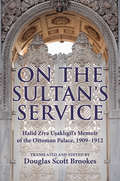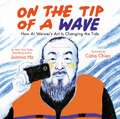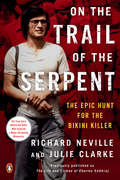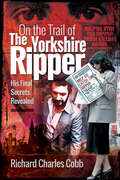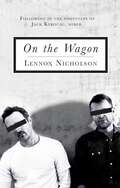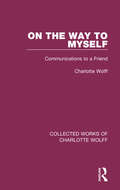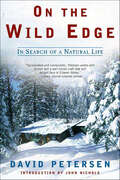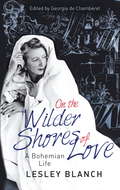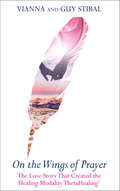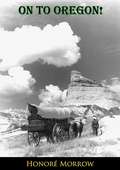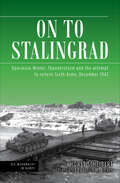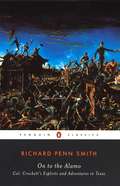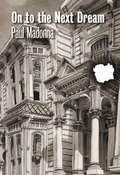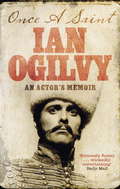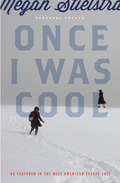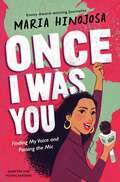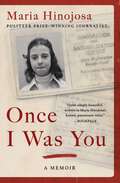- Table View
- List View
On the Run: A Mafia Childhood
by Gregg Hill Gina HillIn the 1970s, Henry Hill pulled off heists and busted heads with the Mob. In the '80s, he became famous - as the antihero of the bestselling book Wiseguy and blockbuster movie Goodfellas. But there was one story he couldn't tell. Now his children, Gregg and Gina, tell it for him. On the Run is the true account of what it's like to grow up in the federal witness protection program. Just as Gregg was celebrating his bar mitzvah and his sister, Gina, was buying her first bra, Henry Hill was informing on his former cronies. Henry, his wife, and children were swept into protective custody. And Gregg and Gina, who'd already been exposed to their father's wild side, were about to be ripped from their home and lose the only normalcy they'd ever known. Taking only what they could fit in a bag, the Hill children began a nightmarish life on the run: constantly moving from town to town, often without warning, and always knowing that their Uncle Jimmy, along with their father's other former "friends," wanted the Hills dead. All the while, Henry, a violent career criminal with a taste for hard drugs and women, used his new identity to break the law and make new enemies - forcing the family to run again and again. For Gina, the journey from Queens to Nebraska to Kentucky to Washington State was one of fierce denial - of trying to see the best in her abusive father, of learning her skills as an amateur actress, and finally uttering the unspeakable truth to her best friend. For Gregg, it was a chronicle of heartache, sacrifice, and violence: giving up a tennis career, standing up his first date because the family had to flee that night, and finally, after a series of near lethal confrontations with his father, running for his life. Title Summary field provided by Blackwell North America, Inc. All Rights Reserved.
On the Shoulders of Giants: My Journey Through the Harlem Renaissance
by Kareem Abdul-JabbarNew York Times bestselling author and living legend Kareem Abdul-Jabbar shares how the power of the Harlem Renaissance led him to become the man he is today—basketball superstar, jazz enthusiast, historian, and Black American icon.In On the Shoulders of Giants, Kareem Abdul-Jabbar invites us on an extraordinarily personal journey back to his birthplace of Harlem through one of the greatest political, cultural, literary, and artistic movements in history. He reveals the tremendous impact the Harlem Renaissance had on both American culture and his own life. Travel deep into the soul of the Renaissance—the night clubs, restaurants, basketball games, and fabulous parties that have made footprints in Harlem&’s history. Meet the athletes, jazz musicians, comedians, actors, politicians, entrepreneurs, and writers who not only inspired Kareem&’s rise to greatness but an entire nation.
On the Side of My People: A Religious Life of Malcolm X
by Louis A. Decaro Jr.The first book-length evaluation of Malcolm X's religious lifeThe mythic figure of Malcolm X conjures up a variety of images--black nationalist, extremist, civil rights leader, hero. But how often is Malcolm X understood as a religious leader, a man profoundly affected by his relationship with Allah? During Malcolm's life and since, the press has focused on the Nation of Islam's rejection of integration, offering an extremely limited picture of its ideology and religious philosophy. Mainstream media have ignored the religious foundation at the heart of the Nation and failed to show it in light of other separatist religious movements. With the spirituality of cultic black Islam unexplored and the most controversial elements of the Nation exploited, its most famous member, Malcolm X, became one of the most misunderstood leaders in history.In On the Side of My People, Louis A. DeCaro, Jr. offers the first book length religious treatment of Malcolm X. Malcolm X was certainly a political man. Yet he was also a man of Allah, struggling with his salvation—as concerned with redemption as with revolution. Drawing on a wide variety of sources, including extensive interviews with Malcolm's oldest brother, FBI surveillance documents, the black press, and tape-recorded speeches and interviews, DeCaro examines the charismatic leader from the standpoint of his two conversion experiences--to the Nation while he was in jail and to traditional Islam climaxing in his pilgrimage to Mecca. Examining Malcolm beyond his well-known years as spokesman for the Nation, On the Side My People explores Malcolm's early religious training and the influence of his Garveyite parents, his relationship with Elijah Muhammad, his often overlooked journey to Africa in 1959, and his life as a traditional Muslim after the 1964 pilgrimage. In his critical analysis of The Autobiography of Malcolm X, DeCaro provides insight into the motivation behind Malcolm's own story, offering a key to understanding how and why Malcolm portrayed his life in his own autobiography as told to Alex Haley. Inspiring and necessary, On the Side My People presents readers with a Malcolm X few were privileged to know. By filling in the gaps of Malcolm's life, DeCaro paints a more complete portrait of one of the most powerful and relevant civil rights figures in American history.
On the Sultan's Service: Halid Ziya Usakligil's Memoir of the Ottoman Palace, 1909–1912
by Douglas Scott BrookesThe renowned Turkish author’s memoir of serving Sultan Mehmed V provides a rare look inside the palace politics of the late Ottoman Empire.Before he became one of Turkey’s most famous novelists, Halid Ziya Usakligil served as First Secretary to Sultan Mehmed V. His memoir of that time, between 1909 and 1912, provides first-hand insight into the personalities, intrigues, and inner workings of the Ottoman palace in its final decades.In post-Revolution Turkey, the palace no longer exercised political power. Instead, it negotiated the minefields between political factions, sought ways to unite the empire in the face of nationalist aspirations, and faced the opening salvos of the wars that would eventually overwhelm the country. Usakligil includes interviews with the Imperial family as well as descriptions of royal nuptials, the palaces and its visitors, and the crises that shook the court. He also delivers an insightful and moving portrait of Mehmed V, the man who reigned over the Ottoman Empire through both Balkan Wars and World War I.
On the Tip of a Wave: How Ai Weiwei's Art Is Changing the Tide
by Joanna HoFrom New York Times bestselling author of Eyes That Kiss in the Corners, Joanna Ho, and critically acclaimed illustrator, Cátia Chien comes a moving, powerful picture book about the life and work of activist and artist, Ai Weiwei.He [Ai Weiwei] felt the life jackets and an idea curled and crested through his fingertips. The way it always did.Told in Joanna Ho’s signature lyrical writing, this is the story that shines a light on Ai Weiwei and his journey, specifically how the Life Jackets exhibit at Konzerthaus Berlin came to be. As conditions for refugees worsened, Ai Weiwei was inspired by the discarded life jackets on the shores of Lesbos to create a bold installation that would grab the attention of the world. Cátia Chien masterfully portrays the intricate life of Ai Weiwei with inspirations from woodblock printing and a special emphasis on the color orange, the same color of the life jackets that became a beacon of hope. Through Cátia’s dynamic and stunning illustrations, we see how Ai Weiwei became the activist and artist he is today while proving the power of art within humanity.
On the Track with…Jeff Gordon
by Matthew F ChristopherMatt Christopher delves into the life of Jeff Gordon, the racing sensation, and recreates his memorable moments with exciting turn-by-turn action. This fast-paced biography includes photos, Gordon's stats, and a list of his NASCAR career highlights.
On the Trail of the Serpent: The Epic Hunt for the Bikini Killer
by Richard Neville Julie ClarkeAn intimate portrait of Charles Sobrhaj--one of the world's greatest conmen and most notorious serial killers, and the subject of THE SERPENT, a new series on Netflix.Charles Sobhraj remains one of the world's great conmen, and as a serial killer, the story of his life and capture endures as legend. Born in Vietnam to a Vietnamese mother and Indian father, Sobhraj grew up deprived of a sense of identity, moving to France before being imprisoned and stripped of his multiple nationalities. Driven to floating from country to country, continent to continent, he became the consummate con artist, stealing passports, smuggling drugs and guns across Asia, busting out of prisons and robbing wealthy associates. But as his situation grew more perilous, he turned to murder, preying on Western tourists dropping out across the 1970s "hippie trail," leaving dead bodies and gruesome crime scenes in his wake, triggering an international manhunt that put him at the top of INTERPOL's most wanted list.On the Trail of the Serpent draws its readers into the story of Sobhraj's life as told exclusively to journalists Richard Neville and Julie Clarke by the investigators, families of the victims, and even Sobhraj himself. Blurring the boundaries between true crime and novelization, this remains the definitive book about Sobhraj--a riveting tale of sex, drugs, adventure, and murder.
On the Trail of the Yorkshire Ripper: His Final Secrets Revealed
by Richard Charles Cobb&“An outstanding analysis of Peter Sutcliffe, his crimes, his victims and the reasons for the failure of the police investigation.&” —North Yorks Enquirer Peter Sutcliffe, The Yorkshire Ripper, remains the most infamous serial killer in British criminal history. His reign of terror saw 13 women brutally murdered and the largest criminal manhunt in British history. Just like Jack the Ripper, his Victorian counterpart of 1888, he remains a killer of almost mythical proportions, yet the locations and circumstances surrounding his foul deeds remain a subject of confusion to this day . . . until now. Using ground breaking new research together with the original police reports, newspaper descriptions and eye witness testimony, we can finally present the truth about what actually happened. For the first time in over four decades we re-examine the crime scenes and deliver the real story of the Yorkshire Ripper murders. &“An extremely detailed, very comprehensive, and at just over 200 pages, not daunting to read, next important addition to any student of true crime&’s library.&” —The True Crime Enthusiast
On the Trail of the Yorkshire Ripper: His Final Secrets Revealed
by Richard Charles Cobb&“An outstanding analysis of Peter Sutcliffe, his crimes, his victims and the reasons for the failure of the police investigation.&” —North Yorks Enquirer Peter Sutcliffe, The Yorkshire Ripper, remains the most infamous serial killer in British criminal history. His reign of terror saw 13 women brutally murdered and the largest criminal manhunt in British history. Just like Jack the Ripper, his Victorian counterpart of 1888, he remains a killer of almost mythical proportions, yet the locations and circumstances surrounding his foul deeds remain a subject of confusion to this day . . . until now. Using ground breaking new research together with the original police reports, newspaper descriptions and eye witness testimony, we can finally present the truth about what actually happened. For the first time in over four decades we re-examine the crime scenes and deliver the real story of the Yorkshire Ripper murders. &“An extremely detailed, very comprehensive, and at just over 200 pages, not daunting to read, next important addition to any student of true crime&’s library.&” —The True Crime Enthusiast
On the Wagon
by Lennox NicholsonJack Kerouac?s On the Road helped to define freedom for a generation. But when a young recovering alcoholic turned to the Beat classic for inspiration, he saw more warning signs and wreckages than enlightenment and self-discovery. Was that really freedom? Setting off from Australia, Lennox Nicholson retraces the journey of Sal Paradise and Dean Moriarty but with one crucial twist ? he will try to stay sober. Instead of booze, Benzos and stolen cars he will rely on the generosity of strangers he meets in the rooms of Alcoholics Anonymous (AA). Along the way, Nicholson talks freedom with everyone he meets. In comparing his own experiences of excess , indulgence and freedom to that celebrated by the Beat writers, he discovers that the chalk-and-cheese forces of Beat and AA have plenty to learn from one another.
On the Wandering Paths (Univocal)
by Sylvain TessonA walking journey through France&’s vast interior becomes a meditation on both personal recovery and the role of history in the present—more than 425,000 copies sold in France After a free-climbing accident lands him in a coma and a hospital for four months, the French writer Sylvain Tesson makes a promise to himself: if he&’s ever able to walk again, he will traverse the entire country of France on foot. Part literary adventure, part philosophical reflection on our contemporary consumer culture, On the Wandering Paths takes us deep into the heart of what Tesson terms France&’s &“hyperrural&” zones. Tracing the obscure paths peasants once followed throughout the countryside, Tesson embarks on a three-month journey of solitude and personal contemplation as he walks along vast stretches of mountain ranges and rivers, encountering ancient Roman stone bridges and walkways, the French Foreign Legion, pagan prayer sites, Provençal villages, and the majestic Mont-Saint-Michel. Connecting deeply with the places he visits, his experiences inspire reflection on the essential need to disengage from the digital and immerse oneself in natural beauty.Rich with humor, historical insight, and literary power, On the Wandering Paths is both a meditation on the act of recovery and a potent recognition of the traces of our past in the present. Asking us to reassess our values and our relationship to the land, Tesson&’s exquisite chronicle through landscapes that continue to resist urbanization and technology is a thoughtful—and thought-provoking—glimpse into a poet&’s adventurous life. Les Chemins de Pierre, a film based on the book starring Jean Dujardin, is due to release in 2022.
On the Waters of the World: The Story of the Meloon Family
by Robert G. FloodIn the closing months of World War II, a Florida-based boat-building firm built hundreds of assault boats under an "impossible" deadline and helped General Dwight Eisenhower defeat Hitler's armies along the Rhine. The feat drew the praise of the U.S. Government and the attention of National Geographic. Today that same firm, Correct Craft of Orlando, Florida, builds the Ski Nautique, considered by many the world's foremost water ski towboat. Behind the genius of Correct Craft, America's oldest family-owned boat building firm, lies the inspiring story of the Meloon family and their commitment to honor God in their business decisions. They kept that commitment, even in times of hardship, and it led them to risk bankruptcy rather than compromise the firm's Christian-based business ethic. Roaming from Cypress Gardens to Sea World, from professional water ski tournaments to nations abroad, these pages tell the story of one family's remarkable impact "on the waters of the world."
On the Way to Myself: Communications to a Friend (Collected Works of Charlotte Wolff #4)
by Charlotte WolffOriginally published in 1969, Dr Charlotte Wolff was the author of three books of psychology: The Human Hand, A Psychology of Gesture and The Hand in Psychological Diagnosis. This book, though it contains much psychology, is not of the same scientific kind as these. It is an autobiography, but not one of the normal kind. It is the history of a mind, not the chronicle of a life. For this reason it is not arranged chronologically but it is constructed round what the author called the creative shock experiences of her life, some of which belong with their consequences rather than with events adjacent in time. The resulting book is one of imaginative psychology. In the course of a life which began on the borders of Poland and carried her to Germany, France, Russia and England, Dr Wolff had met and known many of the most famous writers, artists and thinkers of the time. In Germany she studied under the founding Existentialists, Husserl and Heidegger; in France she carried out psychological research under Professor Henri Wallon and was also assisted by the Surrealists, André Breton, St. Exupéry, Paul Eluard; in England she was aided in her work by Sir Julian Huxley, Aldous Huxley and his wife, Dr William Stephenson, Dr Earle and others. But Dr Wolff’s earliest creative work was as a poet, and though she turned to psychology, her interest in art brought her into touch at different times with Ravel, Virginia Woolf, Bernard Shaw, Lady Ottoline Morrell, Thomas and Heinrich Mann, Baladine Klossowska and many more. Dr Earle wrote of her that she is ‘an artist of psychology’, and it is thus that she appears in this odd and fascinating book. Today it is an interesting glimpse in to the life of an early feminist psychologist. Her later research focused on sexology, her writing on lesbianism and bisexuality were influential early works in the field.
On the Wild Edge: In Search of a Natural Life
by David Petersen"Opinionated and iconoclastic, Petersen writes with humor and a well-honed craft that will delight fans of Edward Abbey." -Library Journal (starred review) Twenty-five years ago David Petersen and his wife, Caroline, pulled up stakes, trading Laguna Beach, California, for a snug hand-built cabin in the wilderness. Today he knows that mountain land as intimately as anyone can know his home. Petersen conflates a quarter century into the adventures of four high-country seasons, tracking the rigors of survival from the snowmelt that announces the arrival of spring to the decline and death of autumn and winter that will establish the fertile ground needed for next year's rebirth. In the past we listened to Henry David Thoreau or Aldo Leopold; today it is Petersen's turn. His observations are lyrical, scientific, and from the heart. He reinforces Thoreau's dictum: "in wildness is the preservation of the earth." In prose rich with mystery and soul, his words are a plea for the survival of the remnant wilderness."Many of us would like to live a life of greater intention and simplicity, but few can and even fewer do. David Petersen is one of those rare human beings among us who lives a wild life with a cultured mind . . . [He] has created a map all of us can follow."-Terry Tempest Williams, author of The Open Space of Democracy
On the Wilder Shores of Love: A Bohemian Life
by Lesley Blanch Georgia de ChamberetMost famous for The Wilder Shores of Love, her book about four women travellers, Lesley Blanch was a scholarly romantic and a bold writer. Her lifelong passion was for Russia, the Balkans and the Middle East. At heart a nomad, she spent the greater part of her life travelling the remote areas her books record so vividly.Edited by her goddaughter Georgia de Chamberet, who was working with her in her centenary year, this book collects together the story of Blanch's marriage, previously published only in French; a selection of her journalism which brings to life the artistic melting pot that was London between the wars; and a selection of her most evocative travel pieces.Illustrated with photos alongside a selection of line drawings by Lesley Blanch
On the Wings of Prayer: The Love Story that Created the Healing Modality ThetaHealing®
by Vianna Stibal Guy StibalThe healing modality ThetaHealing has become known all over the world for its incredible power to help and heal people from all walks of life. While ThetaHealing has touched the lives of many, few people know the beautiful love story that led to its creation. Now, for the first time, this tale of devotion and commitment can be read by all, in Vianna and Guy Stibal's beautiful book, On the Wings of Prayer.This is the true-life story of a sacred union of souls. The formation of a healing modality has its own considerable challenges, many of which are beyond the spectrum of common experience. On the Wings of Prayer is a journey through the joys and heartaches that Vianna and Guy encountered, that led them to create modes of healing for their personal growth on many levels of existence. It is a story dedicated to all those romantics out there that still have the courage to believe that love can last the ages.
On to Oregon!
by Honoré MorrowThe epic journey of the Sager children by covered wagon from Missouri to Oregon in 1848.“Father wanted us to go on to Oregon, and that’s where we’re going!”When the wagon train pulled out of Missouri in 1844, John Sager thought the trip West would be great fun.But now both his father and mother are dead. Young John is determined to lead his brother and five sisters a thousand miles through the wilderness to Oregon...braving hunger, thirst, and unknown danger—alone!Based on a true story, this is an inspiring saga of heroism and a family’s perseverance in the rugged Old West.
On to Stalingrad: Operation Winter Thunderstorm and the Attempt to Relieve Sixth Army, December 1942 (Die Wehrmacht im Kampf)
by Horst ScheibertThe first English translation of a German account of the attempt to relieve the Nazis&’ Sixth Army at Stalingrad during World War II. In late November 1942, Soviet forces surrounded General Friedrich Paulus&’ Sixth Army in a pocket at the Russian city of Stalingrad. In response the Germans planned a relief operation, Operation Winter Thunderstorm, intended to break through the Soviet forces and open the pocket, releasing the encircled units. The 6th Panzer Division was the spearhead of the German relief force. The attack started on 12 December 1942 and was aborted on 23 December after heavy Soviet counterattacks. This failure sealed the fate of the German Sixth Army in Stalingrad. This account of the operation was first published in German in 1956, written by the well-respected military historian and retired German officer, Horst Scheibert, who was a tank commander in 6th Panzer Division during the attempt. Utilizing many excerpts from war diaries, and telegrams sent during operations, it is a unique account of the entire operation from the situation in mid-November through the two German offensives, the Soviet counteroffensive, and ongoing fighting until early January. This book includes 16 maps from the original edition and is the first English translation of this important German account.Praise for On to Stalingrad &“Rich and detailed like very few of its kind are, with a crisp writing style and critical eye for the events of the battlefield that almost makes you feel as if you were there with Sixth Panzer. On to Stalingrad is a book so compelling that it simply should not be overlooked for your personal and professional enjoyment.&” —ARMOR Magazine &“Offers a unique viewpoint from an actual veteran who is able to provide an immediate military analysis of this mostly forgotten operation of the Stalingrad campaign.&” —New York Journal of Books
On to the Alamo
by John Seelye Richard Penn SmithDavid "Davy" Crockett (1786-1836) was born in Tennessee, fought alongside Andrew Jackson in the War of 1812, and later served three terms in the House of Representatives before heading to Texas, where he died defending the Alamo. Col. Crockett's Exploits and Adventures in Texas, first published after Crockett's death and disingenuously attributed to him, was written by Richard Penn Smith as a narrative that promoted a sanitized account of the Alamo as a heroic effort by Americans to stem the Mexican "invasion" of Texas. The story, which was a huge success in its day, created a myth of the battle that pervaded the collective American memory for more than 150 years and reinforced the image of Davy Crockett as the "King of the Frontier."
On to the Next Dream
by Paul Madonna<P>Paul Madonna’s popular comic, "All Over Coffee” had been running for twelve years in the San Francisco Chronicle when he was evicted from his longtime home and studio in the Mission District, ground-zero in the "tech wars” transforming the city. <P>Suddenly finding himself yet another victim of San Francisco’s overheated boomtown housing market, with its soaring prices and rampant evictions, Madonna decided to use his comic as a cathartic public platform to explore the experience, and to capture the complex, highly charged atmosphere of a city-and a life-being forced through a painful transition. <P>In a series of drawings and stories, Madonna evokes the sense of vertigo induced by being forced from his home, and the roil of emotions that ensue as he enters into the city’s brutal competition for a place to live. The line between reality and surreality begins to blur almost immediately, in real life and in his comic. Absurd, maddening, and all-too-poignant, these drawings and stories capture the spirit of not just San Francisco, but a cultural epidemic that has now spread to cities around the world." <P>Paul Madonna is a San Francisco-based artist and writer. He is the creator of the comic series "All Over Coffee” and the author of two books, All Over Coffee and Everything is its own reward. His drawings and stories have appeared in numerous books and journals as well as galleries and museums, including the San Francisco Contemporary Jewish Museum and the Oakland Museum of California.
Once A Saint: An Actor's Memoir
by Ian Ogilvy'A wickedly entertaining new memoir' Daily MailAccording to the Daily Mail Ian Ogilvy was 'the undisputed star of 1970s TV as the dashing Simon Templar in Return Of The Saint'. The show turned him into a household name, causing him to be touted as the next James Bond. From a liberal upbringing in post-war Britain, boarding school escapades and life at RADA, Ogilvy enjoyed an acting career spanning more than fifty years, including TV show Upstairs, Downstairs and films Witchfinder General, No Sex Please: We're British and Death Becomes Her. His story plays host to a spectacular all-star cast including Boris Karloff, Hayley Mills, Penelope Keith, Derek Nimmo, Timothy Dalton, Derek Jacobi and Meryl Streep, and Ogilvy gives a vivid account from behind the scenes of the Golden Age of television and film.Once a Saint is an amusing and unvarnished story: a tremendously endearing tale from a working actor. His story is modest and endlessly charming, told in such a way that opens a reader's heart to him.
Once A Saint: An Actor's Memoir
by Ian Ogilvy'A wickedly entertaining new memoir' Daily MailAccording to the Daily Mail Ian Ogilvy was 'the undisputed star of 1970s TV as the dashing Simon Templar in Return Of The Saint'. The show turned him into a household name, causing him to be touted as the next James Bond. From a liberal upbringing in post-war Britain, boarding school escapades and life at RADA, Ogilvy enjoyed an acting career spanning more than fifty years, including TV show Upstairs, Downstairs and films Witchfinder General, No Sex Please: We're British and Death Becomes Her. His story plays host to a spectacular all-star cast including Boris Karloff, Hayley Mills, Penelope Keith, Derek Nimmo, Timothy Dalton, Derek Jacobi and Meryl Streep, and Ogilvy gives a vivid account from behind the scenes of the Golden Age of television and film.Once a Saint is an amusing and unvarnished story: a tremendously endearing tale from a working actor. His story is modest and endlessly charming, told in such a way that opens a reader's heart to him.
Once I Was Cool
by Megan StielstraIn these insightful, compassionate, gutsy, and heartbreaking personal essays, Stielstra, whose essay "Channel B" was recently featured in Best American Essays 2013 edited by Cheryl Strayed, explores the messy, maddening beauty of adulthood with wit, intelligence, and biting humor.The essays in Once I Was Cool tackle topics ranging from beating postpartum depression by stalking her neighbor, to a surprise run-in with an old lover while on ecstasy, to blowing her mortgage on a condo she bought because of Jane's Addiction. Or, said another way, they tackle life in all of its quotidian richness.
Once I Was You -- Adapted for Young Readers: Finding My Voice and Passing the Mic
by Maria HinojosaEmmy Award and Pulitzer Prize–winning journalist Maria Hinojosa has created a brand-new, unique version of her adult memoir, which was an NPR Best Book of 2020, for young readers, blending her story with perspectives on history in the vein of Jason Reynolds&’s Stamped.&“There is no such thing as an illegal human being.&” Maria Hinojosa is an Emmy Award–winning journalist, a bestselling author, and was the first Latina to found a national independent nonprofit newsroom in the United States. But before all that, she was a girl with big hair and even bigger dreams. Born in Mexico and raised in the vibrant neighborhood of Hyde Park, Chicago, Maria was always looking for ways to better understand the world around her—and where she fit into it. Here, she combines stories from her life, beginning with her family&’s harrowing experience of immigration, with truths about the United States&’s long and complicated relationship with the people who cross its borders, by choice or by force. Funny, frank, and thought-provoking, Maria&’s voice is one you will want to listen to again and again.
Once I Was You: A Memoir (Atria Espanol Ser.)
by Maria HinojosaNPR&’s Best Books of 2020 BookPage&’s Best Books of 2020 Real Simple&’s Best Books of 2020 Boston.com readers voted one of Best Books of 2020 &“Anyone striving to understand and improve this country should read her story.&” —Gloria Steinem, author of My Life on the Road The Emmy Award–winning journalist and anchor of NPR&’s Latino USA tells the story of immigration in America through her family&’s experiences and decades of reporting, painting an unflinching portrait of a country in crisis in this memoir that is &“quite simply beautiful, written in Maria Hinojosa&’s honest, passionate voice&” (BookPage).Maria Hinojosa is an award-winning journalist who, for nearly thirty years, has reported on stories and communities in America that often go ignored by the mainstream media—from tales of hope in the South Bronx to the unseen victims of the War on Terror and the first detention camps in the US. Bestselling author Julia Álvarez has called her &“one of the most important, respected, and beloved cultural leaders in the Latinx community.&” In Once I Was You, Maria shares her intimate experience growing up Mexican American on the South Side of Chicago. She offers a personal and illuminating account of how the rhetoric around immigration has not only long informed American attitudes toward outsiders, but also sanctioned willful negligence and profiteering at the expense of our country&’s most vulnerable populations—charging us with the broken system we have today. An urgent call to fellow Americans to open their eyes to the immigration crisis and understand that it affects us all, this honest and heartrending memoir paints a vivid portrait of how we got here and what it means to be a survivor, a feminist, a citizen, and a journalist who owns her voice while striving for the truth. Also available in Spanish as Una vez fui tú.
